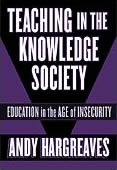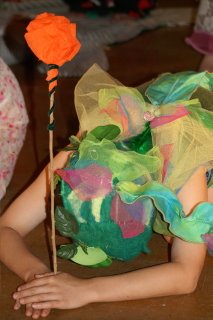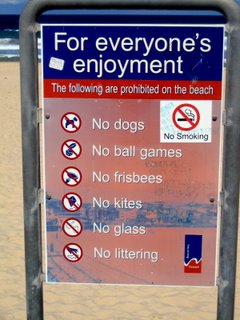Wednesday, September 27, 2006
Tuesday, September 26, 2006
Creativity
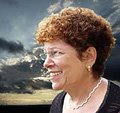
The things we fear most in organizations fluctuations, disturbances, imbalances are the primary sources of creativity.
Creativity
(i) preparation (preparatory work on a problem that focuses the individual's mind on the problem and explores the problem's dimensions),
(ii) incubation (where the problem is internalized into the subconscious mind and nothing appears externally to be happening),
(iii) intimation (the creative person gets a 'feeling' that a solution is on its way),
(iv) illumination or insight (where the creative idea bursts forth from its subconscious processing into conscious awareness); and
(v) verification (where the idea is consciously verified, elaborated, and then applied).
In numerous publications, Wallas' model is just treated as four stages, with "intimation" seen as a sub-stage. There has been some empirical research looking at whether, as the concept of "incubation" in Wallas' model implies, a period of interruption or rest from a problem may aid creative problem-solving.
Ward[9] lists various hypotheses that have been advanced to explain why incubation may aid creative problem-solving, and notes how some empirical evidence is consistent with the hypothesis that incubation aids creative problem-solving in that it enables "forgetting" of misleading clues. Absence of incubation may lead the problem solver to become fixated on inappropriate strategies of solving the problem.[10] This work disputes the earlier hypothesis that creative solutions to problems arise mysteriously from the unconscious mind while the conscious mind is occupied on other tasks.[11]
Wallas considered creativity to be a legacy of the evolutionary process, which allowed humans to quickly adapt to rapidly changing environments.
Fostering creativity
creativity techniques
Daniel Pink, in his 2005 book A Whole New Mind, repeating arguments posed throughout the 20th century, argues that we are entering a new age where creativity is becoming increasingly important.
In this conceptual age, we will need to foster and encourage right-directed thinking (representing creativity and emotion) over left-directed thinking (representing logical, analytical thought).
Nickerson provides a summary of the various creativity techniques that have been proposed. These include approaches that have been developed by both academia and industry:
2. Building basic skills
3. Encouraging acquisitions of domain-specific knowledge
4. Stimulating and rewarding curiosity and exploration
5. Building motivation, especially internal motivation
6. Encouraging confidence and a willingness to take risks
7. Focusing on mastery and self-competition
8. Promoting supportable beliefs about creativity
9. Providing opportunities for choice and discovery
10. Developing self-management (metacognitive skills)
11. Teaching techniques and strategies for facilitating creative performance
12. Providing balance
Some see the conventional system of schooling as "stifling" of creativity and attempt (particularly in the pre-school/kindergarten and early school years) to provide a creativity-friendly, rich, imagination-fostering environment for young children.
Compare Waldorf School.
Sunday, September 24, 2006
Values, Weapons and Colleagues

Hopefully, humility leads us up out of our bunkers, to open ground where we step away from the rigidity of our positions and become a bit curious. We need to be open to the possibility that colleagues and even strangers have information and perspectives that may be of value to us.
Margaret J. Wheatley
Saturday, September 23, 2006
What's Worth Fighting for Out There
Andy Hargreaves
Teachers college Press 1998
Changing Times
Changing teachers, Changing Times
Teachers college Press 1994
"The rules of the world are changing. It is time for the rules of teaching and teachers' work to change with them"
Hargreaves sets out what it means to teach in the new knowledge society-- to prepare young people for a world of creativity and flexibility and to protect them against the threats of mounting insecurity. He provides inspiring examples of schools that operate as creative and caring learning communities and shows how years of "soulless standardization" have seriously undermined similar attempts made by many non-affluent schools. Hargreaves takes us beyond the dead-ends of standardization and divisiveness to a future in which all teaching can be a high-skill, creative, life-shaping mission because "the knowledge society requires nothing less."
This major commentary on the state of today's teaching profession in a knowledge-driven world is theoretically original and strategically powerful-- a practical, inspiring, and challenging guide to rethinking the work of teaching.
Published by Teachers College Press, 2003
Sense of Place

I know a Place.....
A Dancing Star.
Friday, September 22, 2006
By the people for the people
Now we are engaged in a great civil war, testing whether that nation, or any nation so conceived and so dedicated, can long endure. We are met on a great battle-field of that war. We have come to dedicate a portion of that field, as a final resting place for those who here gave their lives that that nation might live. It is altogether fitting and proper that we should do this.
But, in a larger sense, we can not dedicate -- we can not consecrate -- we can not hallow -- this ground. The brave men, living and dead, who struggled here, have consecrated it, far above our poor power to add or detract. The world will little note, nor long remember what we say here, but it can never forget what they did here. It is for us the living, rather, to be dedicated here to the unfinished work which they who fought here have thus far so nobly advanced. It is rather for us to be here dedicated to the great task remaining before us -- that from these honored dead we take increased devotion to that cause for which they gave the last full measure of devotion -- that we here highly resolve that these dead shall not have died in vain -- that this nation, under God, shall have a new birth of freedom -- and that government of the people, by the people, for the people, shall not perish from the earth.
Basic Needs
People are driven by six basic needs. All of our choices and behaviors are based upon the urgency for SURVIVAL, POWER, LOVE, BELONGING, FREEDOM, and FUN. Glasser asserts that 95% of all discipline problems are misguided efforts of children trying to achieve power.
By understanding the drives for SURVIVAL, POWER, LOVE, BELONGING, FREEDOM, and FUN in people, we become more conscious of the need for our world to be a quality world of our choosing.
- The only person whose behavior we can control is our own.
- All we can give another person is information
- All long-lasting psychological problems are relationship problems.
- The problem relationship is always part of our present life.
- What happened in the past has everything to do with what we are today, but we can only satisfy our basic needs right now and plan to continue satisfying them in the future.
- We can only satisfy our needs by satisfying the pictures in our Quality World.
- All we do is behave.
- All behaviors are Total Behaviors and are made up of four components: acting, thinking, feeling and physiology. All Total Behaviors are chosen, but we only have direct control over the acting and thinking components.
- We can only control our feeling and physiology indirectly through how we choose to act and think.
- All Total Behavior is designated by verbs and named by the part that is the most recognizable.Whoops that's ELEVEN?? - Glasser couldn't count!
Tuesday, September 12, 2006
The School and the Teacher
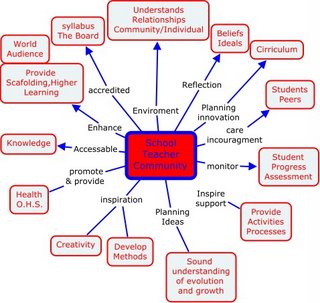
Who dares to teach must never cease to learn ~ John Cotton Dana
Peter Henschel
http://www.linezine.com/6.2/articles/phuwnes.htm
Here are three reasons why you should consider building community into your overall learning strategy:
* Approximately 70 percent of what an employee needs to know to do his or her job successfully is learned outside of formal training, according to Peter Henschel's article "Understanding and Winning the Never-Ending Search for Talent: The Manager’s Core Work in the New Economy." Therefore, communities extend learning by creating a structure in which people can learn from informal interactions.
* Tacit knowledge, which is informal knowledge about how things really get done, is extremely difficult to capture, codify, and deliver through discrete learning objects and traditional training programs. Communities are a way to elicit and share practical know-how that would otherwise remain untapped.
* Creating and structuring opportunities for people to network, communicate, mentor, and learn from each other can help capture, formalize, and diffuse tacit knowledge. Communities become a boundaryless container for knowledge and relationships that can be used to increase individual effectiveness and a company’s overall competitive advantage.
Indeed, for most learning professionals, the question isn’t whether building communities will deliver value to the organization, but rather what kind of community does it need and what steps does the company need to take to build one.
Monday, September 11, 2006
Education is what remains....
Outcomes Based Learning
Spady(1994) suggests ten categories of outcomes, based on "fundamental life performance roles"(P.21). he suggested that these life performances roles require complex applications of many kinds of knowledge and all kinds of competence as people confront the challenges surrounding them in their social systems. He proposed that no matter what major life roles learners faced after formal education(worker,employer,parent,etc.), they would need to be competent in his Ten Inter-Related Life Performance Roles.
2. Listener and Communicator.
3. Implementer and Performer.
4. Problem Finder and Solver.
5. Planner and Designer.
6. Creator and Producer.
7. Teacher and Mentor.
8. Supporter and Contributor.
9. Team Member and Partner.
10. Leader and Organiser.
References
Outcomes-Based education.
Principles and Possibilities.
Associate Professor Roy Killen.
out come based education
Monday, September 04, 2006
Saturday, September 02, 2006
Professor John Hattie
You need chaos in your soul to give birth to a dancing star
Title quote by Friedrich Nietzsche
without accepting it~Aristotle
Affective
Skills in the affective domain describe the way people react emotionally and their ability to feel another living thing's pain or joy. Affective objectives typically target the awareness and growth in attitudes, emotion, and feelings.
There are five levels in the affective domain moving through the lowest order processes to the highest:
- Receiving - The lowest level; the student passively pays attention. Without this level no learning can occur.
- Responding - The student actively participates in the learning process, not only attends to a stimulus, the student also reacts in some way.
- Valuing - The student attaches a value to an object, phenomenon, or piece of information.
- Organizing - Students can put together different values, information, and ideas and accommodate them within their own schema; comparing, relating and elaborating on what has been learnt.
- Characterizing - The student has held a particular value or belief that now exerts influence on their behaviour so that it becomes a characteristic.
Psychomotor
Skills in the psychomotor domain describe the ability to physically manipulate a tool or instrument like a hand or a hammer. Psychomotor objectives usually focus on change and/or development in behaviour and/or skills.
Bloom and his colleagues never created subcategories for skills in the psychomotor domain, but since then other educators have created their own psychomotor taxonomies [1].
Cognitive
Skills in the cognitive domain revolve around knowledge, comprehension, and "thinking through" a particular topic. Traditional education tends to emphasize the skills in this domain, particularly the lower-order objectives.
There are six levels in the taxonomy, moving through the lowest order processes to the highest:
- Knowledge
- Exhibit memory of previously-learned materials by recalling facts, terms, basic concepts and answers
-
- Knowledge of specifics - terminology, specific facts
- Knowledge of ways and means of dealing with specifics - conventions, trends and sequences, classifications and categories, criteria, methodology
- Knowledge of the universals and abstractions in a field - principles and generalizations, theories and structures
- Comprehension
- Demonstrative understanding of facts and ideas by organizing, comparing, translating, interpreting, giving descriptions, and stating main ideas
-
- Translation
- Interpretation
- Extrapolation
- Application
- Using new knowledge. Solve problems to new situations by applying acquired knowledge, facts, techniques and rules in a different way
- Analysis
- Examine and break information into parts by identifying motives or causes. Make inferences and find evidence to support generalizations
-
- Analysis of elements
- Analysis of relationships
- Analysis of organizational principles
- Synthesis
- Compile information together in a different way by combining elements in a new pattern or proposing alternative solutions
-
- Production of a unique communication
- Production of a plan, or proposed set of operations
- Derivation of a set of abstract relations
- Evaluation
- Present and defend opinions by making judgments about information, validity of ideas or quality of work based on a set of criteria
-
- Judgments in terms of internal evidence
- Judgments in terms of external criteria
Friday, September 01, 2006
Teaching ?
Teaching as a Profession ? Why ?
What makes us take up the calling, and for many of us, late in life, surely its not the pay and conditions, and at times in our communities our peers consider it a lower profession to Banking or used car salesman.
"Modern cynics and skeptics....see no harm in paying those to whom they entrust the minds of their children a smaller wage than to those to whom they entrust the care of their plumbing"~ John F Kennedy
Even politicions don't stand up for our educators and teachers of our future. Education and Health should be considered the highest, honourable and worthy of the Professions.
As Hattie states in his last two paragraphs of "Building Teacher Quality"Oct 2003
"We do have excellent teachers ,but we have reticence to identify such excellence in the fear that the others could be deemed not-excellent. We work on the absurd assumption that all teachers are equal, which is patently not true to any child, any parent, any principal, and known by all teachers. Such an assumption of equality brings all teachers down to the latest press scandal about a teacher, and our professions needs and deserves better than this. every other profession recognizes and esteems excellence ( Queens Counsels, Colleges of Surgeons, Supreme Court Judges) but in teaching we reward primarily by experience irrespective of excellence, we promote the best out of the classroom, and we have few goalposts to aim for in professional development, instead allowing others to define what latest fad, what new gimmick, what new policy will underline the content of professional development.
Like expertise in teaching, we need a deeper representation of excellence in teachers, a greater challenge and commitment to recognizing excellence, and a coherent, integrated, high level of deep understanding about teacher expertise."
This last pargraph resinated on a personal level, the need for a deeper representation of excellence in my life, to identify the ethics and values I represent as a teacher,
"Morality, like Art, means drawing a line someplace" Oscar Wilde(1854-1900)
What were going to be, my personal goal posts? What lines, I would draw in teaching?
Life experiences, How I see my role.
Pallative care taught me the value of Truth and Impermanence, a deeper understanding of Tibetan Buddhism "The root to Happiness"lies in the acceptance that life is uncertain. Now working as an assistant teacher I found great truth and change in children and young adults, and like pallative care, students need safe, support, encouragement and reassureance.
Teaching as a profession, is a work of worth, meaning and value.
"When we seek for connection, we restore the world to wholeness. Our seemly separate lives become meaningful as we discover how truly necessary we are to each other" Margret J Wheatley.
The things we fear most in organizations -- fluctuations, disturbances, imbalances -- are the primary sources of creativity.
Hattie and Jaeger in review" Building Teacher Quality Oct 2003
We identified five major dimensions of excellent teachers. Expert teacher:
- Can identify essential representations of their subject(s).
- can guide learning through classroom interactions.
- Can monitor learning and provide feedback.
- can attend to affective attributes.
- can influence students outcomes


